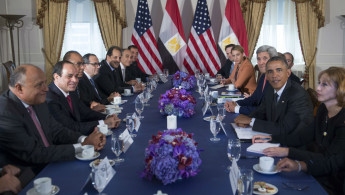The West's friendships with coup leaders
The rumour mill has it that the delay in confirming the death sentence on deposed Egyptian President Mohamed Morsi came because the man who overthrew the country's first democratically elected leader, President Abdel Fattah al-Sisi, is on a trip to Germany, meeting Chancellor Angela Merkel and furthering German-Egyptian economic ties.
Condemning Morsi to death in a case that presumes the ousted leader conspired with Hamas, Hizballah and Iran, in a trial widely criticised by international human rights groups - right when Sisi is attempting to project an image of respectability in the West, would have been potentially awkward.
Yet, despite the gross human rights abuses that have occurred in Egypt since the July 2013 coup, Sisi seems to have the full backing of the West.
Events such as the Rabaa massacre - a state massacre of protesters with few parallels in modern times - the imprisonment of journalists - Egyptian and foreign alike, on nonsensical charges - and mass death sentences on an unprecedented scale, have been met with only light condemnation from western capitals, and the odd slap on the wrist.
| An autocrat who overthrew an elected government, still being backed by the West? Don't be so surprised. |
Better yet, the head of the International Monetary Fund, Christine Lagarde, US Secretary of State John Kerry, and the UK foreign minister, Philip Hammond, all took turns to praise Sisi and back his case for economic reform earlier this year at a conference in Sharm el-Sheikh.
A leader with autocratic tendencies, overthrowing a democratically elected government, still being backed by the West? Don't be so surprised.
In reality, this is a long tradition in the Middle East. Western countries, and primarily the United States, the United Kingdom and France, have often set aside any moral qualms they may have had in supporting those who overthrow democracy, with the argument that the democratic victors were dangerous - read Communists, Islamists or Socialists - or that they have to deal with the powers on the ground.
We can start with Syria in 1949, and the first post-Second World War coup in the Middle East. Only a few years out of French rule over the country, Syrians were deciding who would rule them by voting. The system was by no means perfect, but it could reasonably be called a democracy - far more democratic a system than the Syrian people have had to deal with in the Assad years, at least.
It wasn't to last. The civilian president, Shukri al-Quwatli, was overthrown by the military and eventually sent packing to Egypt.
The Americans were not just casual observers. According to ex-CIA operatives, including Miles Copeland, sent by the CIA to Syria in 1947, the US had a big part to play. Quwatli was seen as a problem, and, in what proved to be an ongoing theme in the region, it was mainly to do with oil.
Quwatli was saying no to the Trans-Arabian Pipeline, which was to take oil all the way from eastern Saudi Arabia to Lebanon, a pipeline which would have been the longest in the world at the time.
Needless to say, once army chief Husni al-Zaim was in charge, the pipeline was approved. The overthrow of democracy in Syria set off a disastrous chain of events, with military coups coming and going. By the time Adib Shishakli was in charge, repression was normal and institutionalised - yet the US and the UK were still trying to court him.
The coup against Shishakli is not particularly well-known, nor is the CIA's alleged role in it.
Yet another in the region, the coup against Iran's elected prime minister, Mohammad Mossadegh, is - largely because the CIA finally admitted in 2013 to their role.
| After Mossadegh re-nationalised a British-owned oil company, the big foreign powers decided he had to go. |
Mossadegh was seen as too close to the pro-Soviet Tudeh Party and, after his re-nationalisation of a British-owned oil company (the forerunner to BP), the big foreign powers decided he had to go.
The CIA actively engineered the 1953 coup, instructing Iran's Shah on what to do, and celebrating their success.
The US would fully back the Shah in the years to come, despite his regime's heavy repression of any dissent, widely practiced torture and the enforcement of a one-party system.
The irony is, if it were not for the overthrow of Mossadegh, conservative religious forces may never have grown powerful enough to topple the Shah and found the Islamic Republic in the 1979 revolution.
This perceived Western acquiescence to coup leaders in the region was witnessed in Algeria in the 1990s, when the army cancelled elections in 1991 because of an impending Islamist victory, leading to an incredibly bloody civil war, to little criticism from the West.
In reality, Western countries will seek ultimately to protect their interests in the region - and often that will result in dealing with coup leaders and autocratic regimes.
In the face of such interests, sometimes democracy just gets in the way.



